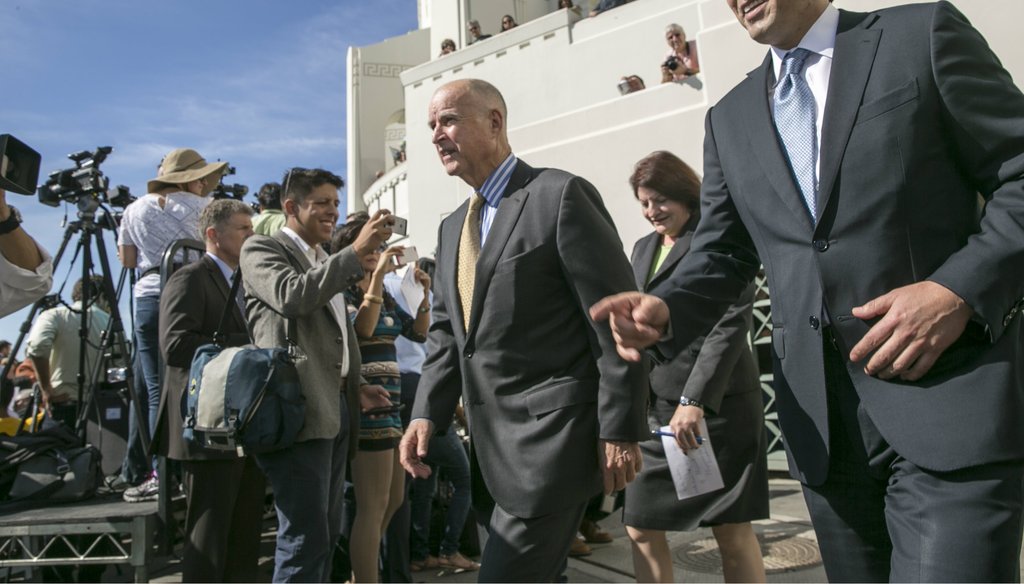Get PolitiFact in your inbox.

California Gov. Jerry Brown, center, arrives with Senate President pro Tempore Kevin De Leon, D-Los Angeles, right, and Assembly speaker Toni Atkins, second from right, to sign landmark legislation SB 350 to combat climate change. Damian Dovarganes / AP
Much of the discussion about the repeal of the Affordable Care Act has centered on the millions of Americans who could lose their health coverage -- particularly if the dismantling of the federal health care law takes place before a replacement plan is enacted.
Politicians and health policy experts in California are now making claims about the possibility that a repeal by Republicans in Washington D.C. could lead not just to coverage loss, but also to painful job losses in the state.
"If in fact the Affordable Care Act is eviscerated, we’re talking about potentially 200,000 jobs being lost in California -- jobs related to the healthcare industry," California State Senate Leader Kevin de León told reporters on Jan. 4, 2017.
De León is a Democrat from Los Angeles.
He and other top state Democrats have said they will aggressively push back against the Republican agenda in D.C., particularly on health care, immigration and environmental issues.
De León’s statement caught our attention given the size of the potential losses and their impact on the state. We found two studies that generally back up his statement. But given the many uncertainties over plans to repeal and potentially replace the ACA, we decided not to rate De León’s claim on our Truth-O-Meter.
Instead, we have examined the study he relied on and outlined how California’s employment picture might be affected.
Our research
There’s considerable uncertainty about which parts of ACA might be repealed and how quickly.
Republicans have yet to agree on a specific replacement proposal, making it difficult to assess how it would offset any potential jobs lost due to repeal.
President-elect Donald Trump this week called for the health law to be dismantled and replaced "essentially simultaneously." Before that call, some Republicans had proposed a "repeal and delay" strategy, where a replacement plan might not be enacted for two years.
We asked De León for evidence backing up his claim about 200,000 job losses. His spokesman cited a study by the left-leaning UC Berkeley Labor Center from December 2016. That study, California’s Projected Economic Losses under ACA Repeal, estimates "the net effect of partial ACA repeal would be the loss of 209,000 jobs in California."
It says 135,000 of those would be "healthcare jobs." The other 74,000 losses would take place at firms that supply the healthcare industry, "such as food service, janitorial, and accounting" companies. Restaurants and retail stores would also lose jobs due to healthcare workers spending less, according to the report. This matches what De León’s described as "jobs related to the healthcare industry."
The UC Berkeley study also notes, however, that repealing the federal health care law has the potential to generate about 40,000 jobs. Those would be created due to the resulting tax cuts for high-income households, and the elimination of the fee on insurers and of penalties for the uninsured and for large employers not offering affordable coverage. The net effect, however, would still be a loss of 209,000 jobs.
But does the UC Berkeley study match up with other estimates?
Even more job losses?
Joanne Spetz is a professor at the University of California at San Francisco who studies health policy and labor economics. She did not participate in the UC Berkeley Labor Center report.
Spetz said the report used "a pretty standard economic forecasting model," adding: "it’s well-vetted."
She called the 200,000 net job loss figure a fair estimate, saying it’s probably somewhere in the middle compared with other projections.
The Commonwealth Fund, a private foundation that promotes health care access for low-income people, estimated in its own study that California could lose even more jobs -- 334,000 overall -- if key parts of the ACA are repealed. California’s healthcare industry, it said, would lose about 121,000 of that total. The report said the remaining losses would come from the state’s construction, retail, finance, insurance and real estate industries.
Nationally, the Commonwealth Fund estimated 2.6 million jobs could be lost in 2019, with California losing the most of any state.
Our research did not turn up any comparable studies by right-leaning groups including the Hoover Institution, Reason Foundation and American Enterprise Institute.
Flawed studies?
Joseph Antos researches the economics of health policy at AEI, a public policy think tank. He said the reports by UC Berkeley and the Commonwealth Fund are flawed because they assume Republicans "will simply repeal the ACA and do nothing else," the odds of which he said are very low.
Any replacement plan enacted by Republicans, Antos said, would help create or maintain jobs in the healthcare industry. He added that it’s also incorrect to assume that the economic boost provided by federal subsidies would disappear entirely if the ACA is repealed. He said the federal government would be able to use that money for other priorities, such as paying down the deficit, which he said could spur foreign investment.
Antos did not have specific projections about how jobs might be affected by the repeal or replacement of Obamacare.
Our conclusion
California State Senate Leader Kevin De León recently said: "If in fact the Affordable Care Act is eviscerated, we’re talking about potentially 200,000 jobs being lost in California -- jobs related to the healthcare industry."
A December 2016 report by the UC Berkeley Labor Center backs up that claim, finding "the net effect of partial ACA repeal would be the loss of 209,000 jobs in California." It says 135,000 of those would be "healthcare jobs." The other losses would take place at firms that supply the healthcare industry or at restaurants and retail businesses affected by lower spending by health care workers. These last two categories fit De León’s description of "jobs related to the healthcare industry."
A separate study by the Commonwealth Fund found California could lose as many as 334,000 total jobs, including 121,000 from the state’s health care industry.
De León and the job loss report he relied on, however, only examine a scenario where the ACA is dismantled, not replaced. It’s not clear what will replace the ACA or when, making it difficult to assess how such a plan might offset the job loss prediction cited by De León.
Given these uncertainties, we can’t rate his claim on our Truth-O-Meter.
Our Sources
California State Senate Leader Kevin León, interview with reporters, Jan. 4, 2017
UC Berkeley Labor Center, California’s Projected Economic Losses under ACA Repeal, Dec. 20, 2016
Commonwealth Fund, Repealing Federal Health Reform: Economic and Employment Consequences for States, accessed January 2017
Interview, Joanne Spetz, professor at the Institute for Health Policy Studies, UC San Francisco, Jan. 9, 2017
Interview, Joseph Antos, health care policy scholar, American Enterprise Institute, Jan. 10, 2017
Los Angeles Times, If Obamacare is repealed, California has the most to lose — putting the insured on edge, Nov. 13, 2016
NBCNews.com, Will Obamacare Repeal Cost Millions of Jobs?, Jan. 6, 2017




















































